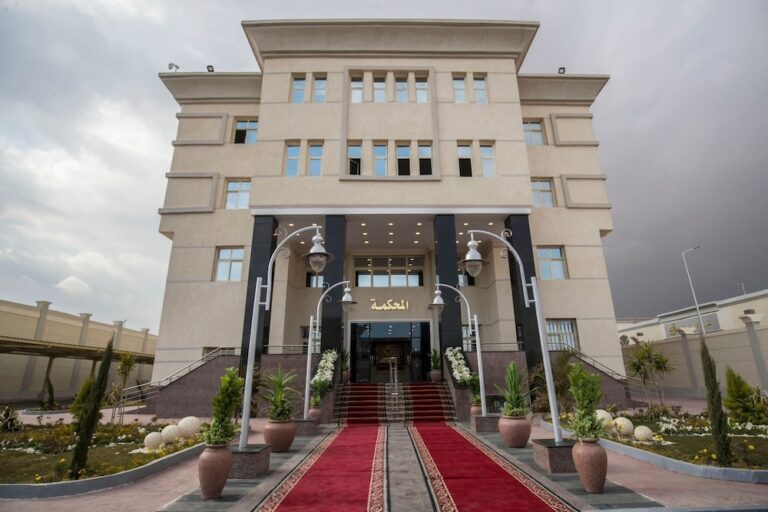(EOHR/IFEX) – The following is a 29 July 2002 EOHR press release: The supreme State Security Court has issued a verdict of imprisonment against Saad El Deen Ibrahim and others. The Egyptian Organization for Human Rights (EOHR) is deeply concerned about the verdict issued on 29/7/2002 by the South Cairo Misdemeanors Court (Constituency 40 – […]
(EOHR/IFEX) – The following is a 29 July 2002 EOHR press release:
The supreme State Security Court has issued a verdict of imprisonment against Saad El Deen Ibrahim and others.
The Egyptian Organization for Human Rights (EOHR) is deeply concerned about the verdict issued on 29/7/2002 by the South Cairo Misdemeanors Court (Constituency 40 – Misdemeanors) in Case no. 13422 of 2002 (registered as number 2561 of 2002 – South Cairo). The verdict was as follows:
“Seven-year prison sentence with hard labor against Dr. Saad El Deen Ibrahim, two-year prison sentence with hard labor against Miss Nadia Abd El Nour, suspended one-year prison sentences against Mr. Khaled Fayad and Mr. Osama Hashem, two-year prison sentence with hard labor against Miss Marwa Zaki, three-year prison sentence against Mr. Hassanein and Mrs. Magda El Sayed, and one-year suspended prison sentences against the rest of the defendants.”
The court issued a decision to confiscate the monies of the [Ibn Khaldun Center for Developmental Studies] and the office itself, in addition to its tools, equipment and supplies.
Dr. Saad El Deen, director of the Ibn Khaldun Center, was arrested on June 2000 along with 27 employees. He was accused of receiving funds from outside Egypt without permission, preparing false reports and forging electoral cards.
The State Security Court subsequently issued a verdict to imprison Saad El Deen for seven years. The other 27 defendants received prison sentences ranging from one to five years. Nine defendants received suspended prison sentences.
This verdict was challenged before the Cassation Court (the criminal constituency). The court accepted the challenge on 6/2/2002, because the verdict had been implemented improperly and the State Security Court had failed to investigate the case correctly. Therefore, the court issued a decision to re-try the defendants before a new judicial body.
EOHR affirms its respect for the Egyptian judiciary’s rulings but it believes that the implementation of the military decree [No. 4 of 1992, upon which the original ruling was based] is in conflict with the verdict issued by the Egyptian Cassation Court on 11/6/2002, regarding challenge no. 3381 of judicial year no. 65, which stated that, “According to decree No. 4 of 1992 of the military ruler’s representative, paragraph 4 of article 1 and article 2 punish those who [â¦] receive funds without permission”. By issuing this decree, the military ruler’s representative unlawfully infringed on the power of the legislature. Thus, this military decree should not be implemented.
The [6 February 2002] verdict handed down by the Cassation Court clarified its stance towards the military decree. No court should disregard the verdict of the Cassation Court, especially since the defense in Saad El Deen’s case, who was the former head of the Supreme Constitutional Court, said that Military Decree No. 4 of 1992 is unconstitutional.
In this regard, EOHR thinks that the continuous use of this military decree is a threat to the human rights movement and Egyptian civil society activists.
EOHR believes that the defendants have the right to challenge the [29 July 2002] verdict before the Cassation Court. In the case of the acceptance of such a challenge, the Cassation Court shall itself be responsible for hearing the case. The Cassation Court’s verdict will be final and cannot be challenged.


